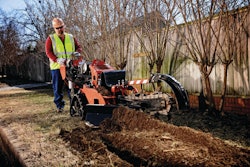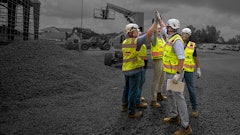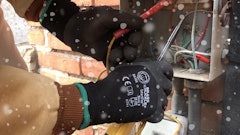
A common trait we've noticed among contractors is their failure to manage risk. Many just don't understand how to properly manage risk. Typically they grossly underestimate it.
Managing risk isn't about avoiding risk. Managing risk means understanding the probabilities that an undesirable outcome might occur and the ramifications to the business when it does occur. It means knowing how to take wise risks. It means using sound systems to control quality, productivity, customer selection, cash flow, etc. Above all, managing risk means not growing too fast and not taking on a project larger than you're ready for.
Risk Comes in Many Forms
- The risk of a field worker getting hurt.
- The risk of not finishing on time.
- The risk of field crews moving slower than planned.
- The risk of underestimating the costs of a project.
- The risk of over-estimating the costs of a project.
- The risk of not getting paid on time...or at all.
Managing risk is about understanding when to place significant bets and when not to. Managing risk means creating strategic plans and budgets so you will know when you are off course and heading towards the side of the road. Managing risk means collecting essential data about your business and using it as the basis for your decision making.
Risk Management Mistakes
Let's talk about some classic risk management mistakes with a few examples thrown in to liven up your reading.
Never go all in. Always leave yourself an out if things go wrong.
Don't take on projects that are substantially larger than you've ever tried before and include types of work whose cost you don't really know.
I was on the phone the other day with a contractor who had gotten himself into a real bind by winning the bid for a job that was three times bigger than anything he had ever tried before and included a type of work that his crews had never before performed. Guess what happened?
Not only did his crews run way long, his failure to maintain schedule created suspicion on the part of the general contractor and client who took the usual course of action in these situations. They withheld money. Lots of money. Naturally, this contractor is now in a real cash bind.
That leads right into one of our favorite risk management topics: maintaining a proper nest egg. You know we're big advocates of maintaining a financial nest egg. That's good advice for every business. It's an essential habit for people operating in the construction industry.
Think of the amount of money left in your pocket after you put in your Texas Hold'em stake as your nest egg. Everybody talks about going all-in at the poker table. They aren't. They are going all in with the part of their money they bought in with. They aren't going all in with everything they own.
Unfortunately 99 percent of contractors at some point in time literally go all in on a project. They are operating without a nest egg sitting in their pockets. They have nothing left in their pockets to play again if they lose their all in bets. The casino probably gives you better odds of winning your money than do most developers, bankers and general contractors. This industry doesn't take prisoners.
You should never take on a project whose delayed cash flow is going to seriously jeopardize your ability to pay your suppliers. This happens frequently to trades who have a significant material component. Once the material suppliers cut you off, you are near done as a business.
A related issue is trades that are required to provide payment and performance bonds. Get yourself upside down with your payables - or worse your payroll taxes - and you may find yourself unable to acquire bonds. No bonds = no work. No work = no digging yourself out of the hole.
Another risk that we see is failure to set performance expectations, specifically with field crews. This mistake is so common that I'm still surprised when a field worker can tell me what he's supposed to get done by the end of the day. Instead of 95 percent of field workers knowing their daily targets only about 5 percent do.
You can't control field productivity and field costs if you don't set, monitor and hold your field crews accountable to their daily production targets. As margins are so severely squeezed, virtually no project has the breathing room to have crews go over their budgeted man-hours.
Another frequently uncontrolled risk problem is estimators. Are you holding them accountable for being able to predict the amount of time and cost it will take to complete projects? It's such a convenient excuse to blame the field crews for being lazy or stupid or whatever. It's also typically a BS excuse. We have a very simple way of testing whether an estimator is doing his job correctly. Few are.
You've worked hard to get to where you are. Don't let it slip away just because you ran into some harsh bad luck.


















